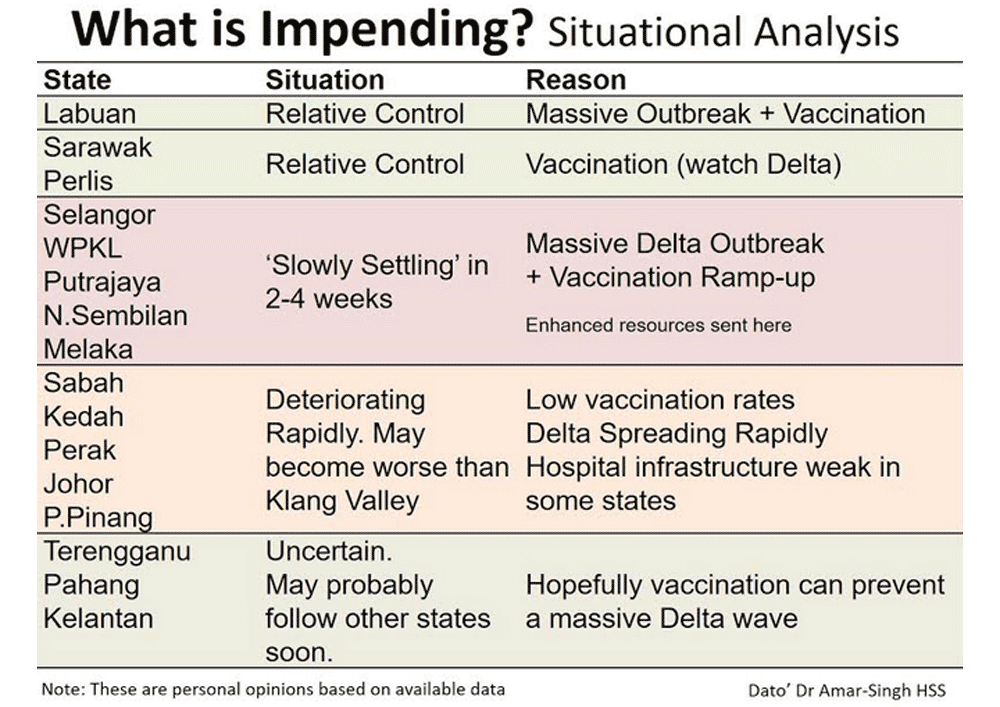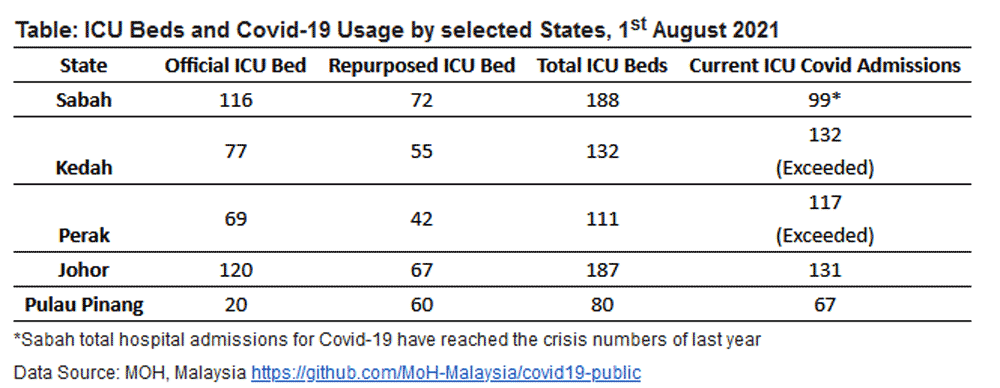About a week ago I wrote the article “Prepare for the Delta Wave of Covid-19 Outside the Klang Valley” to highlight the deteriorating situation in some states. This article is to share the realities and crisis that is already upon us.
Situational analysis
The graphic below (attached) shows a situational analysis of what is potentially an impending crisis for different states. The situation in the Greater Klang Valley (Selangor, Kuala Lumpur, Putrajaya and Negeri Sembilan) will probably slowly settle down over the next two to four weeks due to the huge Delta outbreak, massive vaccination ramp-up and enhanced resources poured in (government and civil society).
However, total numbers in the country and even deaths may not come down as the Delta wave hits other states hard, especially Sabah, Kedah, Perak, Johor and Penang. These states are deteriorating rapidly and may become worse than Klang Valley as they have low vaccination rates (due to low vaccine supply) and some have a weak hospital infrastructure (especially Sabah). All these states have second dose (completed) vaccination rates under 20 percent.
The table below shows the intensive care unit (ICU) beds Covid-19 usage for these five states. It is important as we look at this data to understand the realities:
1. The trend of ICU bed usage for July is a steep upward curve.
2. Almost all states have exceeded their official ICU bed numbers. These are the original ICU beds they had and are of far better quality than repurposed ICU beds.
3. Kedah and Perak have exceeded their total ICU beds (original and repurposed beds) and are in full crisis mode.
4. Sabah may “look” better but Sabah’s total hospital admissions for Covid-19 have reached the crisis numbers of last year. The state hospitals are struggling to cope.
5. Remember that these numbers do not count patients who should be in ICU beds (Category 4 and 5) but are being managed in Emergency Departments (casualties) and quarantine centres. Kedah also has a high number of brought in dead patients.
We can never be prepared enough for Delta
We need an all-of-society approach to deal with the crisis as it grows. I would like to make some suggestions for the health departments, state governments, corporate bodies, civil society and the general public. More details can be found in the “Health Emergency Action Plan: Roadmap to Recovery from Covid-19” we wrote recently.
1. True, reality-based data sharing of the situation by state health departments
It is vital that the public in each crisis state (Sabah, Kedah, Perak, Johor and Pulau Pinang) be aware of the full reality. The time for “don’t worry, everything is OK” or “we are in control of the situation” or “we have prepared for this crisis” is past, these statements are of no value. Delta does not respect or care about these attempts to “not alarm” the public. We can never be prepared enough for Delta and the Klang Valley, with all its resources, shows this clearly. State health departments must have daily crisis sharing with the public (media, Facebook, other online outlets). Trust is crucial to fighting the pandemic and this is based on transparency.
2. State-level disaster management teams led by state Health directors supported fully by state governments and with a strong liaison to corporate bodies and NGOs
Those of us outside of the Klang Valley know that no help is coming for our states. The federal government has limited funds, having invested significant resources to support the Klang valley. Hence, we must work very closely with wealthy business leaders and NGOs to ramp up resources and services. We need strong, decisive leadership and not individuals from the state administration looking to make a financial gain out of the crisis.
3. Don’t put all our eggs in the vaccine basket
While we advocate for more vaccine supply and ramp up vaccination we must not put our hopes in that measure alone; we need to use good public health measures as the World Health Organisation repeatedly tells us. Lockdowns are not the solution. Good mask use, avoiding all unnecessary social interaction, effective contact tracing, using RTK-Ag testing for confirmation, etc. The continued use of large PPVs centres is a risk for Covid-19 transmission. We should fully transition to using maternal and child health clinics, school health teams, GPs, private hospitals, outreach teams.
What can corporate bodies, NGOs and the public do to support their states?
1. Purchase and donate equipment to the hospitals and quarantine centres
Corporate bodies, NGOs and the public should liaison directly with individual specialists and medical officers to know the real needs on the ground while protecting their identity. They will better inform you about what items they need and where to get them.
a. Important items to manage patients include oxygen concentrators, oxygen tanks, oxygen regulators, infusion pumps (to deliver drugs), portable suction machines, portable vital sign monitors, blood pressure monitoring sets, ECG machines, stretchers, canvas beds, etc.
b. Support the personal protective equipment (PPE) of health staff which are in high usage, including N95 masks, powered air-purifying respirators (PAPR), isolation gowns, face shield or goggles, gloves, disposable caps, foot wear, etc.
c. Provide MDA-approved RTK-Ag saliva test kits to enable health staff to speed up and increase testing of all contacts in clusters and the community.
d. Consider offering reliable emergency transport services because the health department ambulance services will be overrun. This may help reduce brought in dead cases.
e. Grow ICU capacity by creating new ICUs - this requires the larger corporate bodies to fund and rapidly construct (within two to four weeks) purpose-built ICU facilities (with HDUs) at major hospitals.
2. Supporting positive individuals and contacts
Individuals who are found positive or are contacts of positive cases will be required to home isolate or be admitted to quarantine facilities. Those in home isolation will require support including:
a. Reliable finger pulse oximeters for monitoring.
b. Medical support for monitoring (video calls daily from health professionals).
c. Some may require practical support in terms of meals.
d. RTK-Ag saliva testing support for those who are contacts (symptomatic or asymptomatic). We should also fund these so that we can enable the public to self-test.
e. Purpose-run quarantine facilities for those that do not have homes or accommodation suitable for home isolation (crowded homes, limited space, migrants, etc). This would mean using hostels and hotels to house them (good ventilation and no central air conditioning; private rooms with toilets).
3. Supporting communities hard hit economically by the pandemic
A significant portion of our public is struggling with daily needs and we need to support them. Although government agencies are doing some of this work, many “fall through the cracks” and have minimal support. Some mechanisms to do this are:
a. Partner with reliable local NGOs and disaster organisations that are doing food delivery to the poor and are setting up and maintaining food banks.
b. Family to family support - adopt poorer families for 6-12 months and offer a fixed sum of money monthly to aid groceries and utility bills.
c. Giving away food coupons that can be redeemed at sundry shops/convenience stores to buy groceries.
d. Hire individuals who have lost jobs to work as volunteers to support others.
e. Also remember we need to support families traumatised by Covid-19, who have lost loved ones, lost their jobs, etc and are struggling to cope emotionally. This includes children who have become temporary (both parents hospitalised) or permanent orphans.
I appeal to the state governments of Sabah, Kedah, Perak, Johor and Penang to be transparent so that extensive and comprehensive emergency actions can be taken by all of society to deal with the crisis that is at hand. There are mothers and fathers, sisters and brothers who need to be saved in the coming weeks. Please let us not wait until we reach a Klang valley crisis status. - Mkini
DR AMAR SINGH HSS is a consultant paediatrician.
The views expressed here are those of the author/contributor and do not necessarily represent the views of MMKtT.






No comments:
Post a Comment
Note: Only a member of this blog may post a comment.